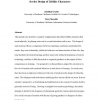216 search results - page 8 / 44 » Designing games for learning: insights from conversations wi... |
ALDT
2009
Springer
14 years 2 months ago
2009
Springer
We present an anytime multiagent learning approach to satisfy any given optimality criterion in repeated game self-play. Our approach is opposed to classical learning approaches fo...
AIS
2006
Springer
13 years 7 months ago
2006
Springer
This paper provides an overview of creating games for change from within an academic context, focusing specifically on the development of educational computer games for middle scho...
AAI
2005
13 years 7 months ago
2005
This special issue describes a number of applications that utilize lifelike characters that teach indirectly, by playing some role in a social interaction with a user. The design ...
CDC
2009
IEEE
14 years 7 days ago
2009
IEEE
— Since Witsenhausen put forward his remarkable counterexample in 1968, there have been many attempts to develop efficient methods for solving this non-convex functional optimiz...
FDG
2009
ACM
14 years 2 months ago
2009
ACM
Engineering education has evolved from providing students solely with technical skills to providing them with courses that provide students with the non-technical “soft skills�...


